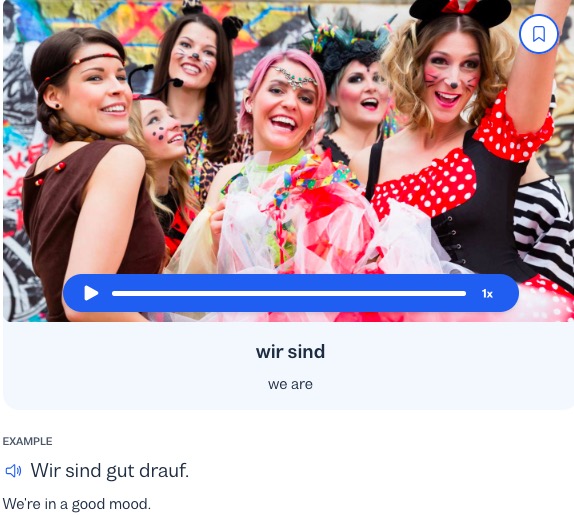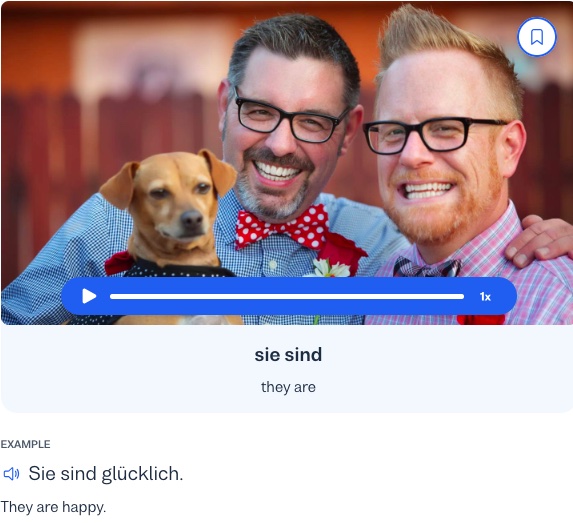The Conjugation of Sein in German
Learn the English counterpart “to be” in German and how to conjugate the commonly-used verb sein.
I want to learn...
“To be, or not to be, that is the question” - Shakespeare's Hamlet
Does your native language harbor and use the verb sein? If so, you will not have any trouble using it and understanding its weight in the language. In case there is no or not much use of the verb sein in your language, you will have to get used to using it, because without it in German (as in English) you will sound robot-like, not like a real person.
The verb sein (to be) is one of the most important and fundamental verbs in many languages. With sein we describe existence, identity, and characteristics, someone's nationality, profession, or physical and emotional state. One of the main building blocks you’ll need in German is the conjugation of sein. That means you will have to change sein so it works in your sentence. It is crucial that you learn how to conjugate sein, as you are going to need this little word from day one. All the more as it’s also used as an “auxiliary” or “helper” verb to form a variety of tenses.
It is an irregular verb (as it is in English), which means that the changes do not follow regular patterns. This guide will introduce you to the various forms of the verb sein and its conjugation.
Fangen wir an! (Let’s get started!)
Learn how to conjugate sein in present tense
First of all, we will be focusing on the changing forms of sein in present tense and how to use the verb at a beginner’s level. Later on, we are going to have a look at its conjugation in the past tense as well.
Let’s get right into it with the most basic form of the verb sein in the Präsens (present tense).
Conjugation of sein in present tense
| German | English |
|---|---|
| sein | to be |
| ich bin | I am |
| du bist | you are |
| er/sie/es ist | he/she/it is |
| wir sind | we are |
| ihr seid | you are |
| sie/Sie sind | they are/you are (formal, singular or plural formal) |
Let’s look at some examples of how to use the conjugation of sein with adjectives to express states of being:
- Ich bin sportlich. (I’m sporty.)
- Er/Sie/Es ist sympathisch. (He/she/it is likable.)
- Wir sind gesund. (We are healthy.)
- Ihr seid lustig. (You are funny.)
- Sie sind krank. (They are sick/You (formal) are sick.)
You should practice and memorize the changed forms by learning them embedded in a small sentence. You can then derive any other use depending on the context.
How to use the conjugation of the verb sein
As this is the most important verb of the German language, it is essential that you know how to use it. In this section we will look at some common sentences so you can start using the verb sein right away.
1. You can use sein with adjectives to express how something or someone is.
- Ich bin gesund. (I am healthy.)
- Das Zimmer ist schön. (The room is beautiful.)
- Wir sind glücklich. (We are happy.)
2. You also need to use sein with nouns to identify living beings or inanimate things and say who or what they are.
- Ich bin Lehrerin. (I am a teacher.)
- Bist du Thomas? (Are you Thomas?)
- Das ist eine Maus. (That is a mouse.)
3. You are going to use sein to indicate that someone or something is at a certain place.
- Ich bin in Berlin. (I’m in Berlin.)
- Das Handy ist im Rucksack. (The mobile is in the backpack.)
Inversion
In questions, the subject and verb are inverted.
For example:
-
Du bist müde. (You are tired.) -> Question: Bist du müde? (Are you tired?)
-
Bist du Thomas? (Are you Thomas?)
-
Ist er zufrieden? (Is he satisfied?)
-
Wo sind wir jetzt? (Where are we now?)
4. Finally, remember to use sein to specify an age, the date and the time.
- Ich bin 12 (Jahre alt). (I’m 12 years old.)
- Es ist Donnerstag, der 29. Juni 2023. (It is Thursday, June 29th 2023.)
- Es ist 6:30 Uhr. (It is 6:30 a.m.)
How to change the verb sein in Präteritum (past simple)
Let’s also have a look at the conjugation of the verb sein in the Präteritum (past tense).
Conjugation of sein in Präteritum (past simple)
| German | English |
|---|---|
| ich war | I was |
| du warst | you were |
| er/sie/es war | he/she/it was |
| wir waren | we were |
| ihr wart | you were |
| sie/Sie waren | they were/you were (singular or plural formal) |
Examples of the verb sein in past tense
Let’s look at some examples of how to use the conjugation of sein in Präteritum:
- Ich war zu Hause. (I was at home.)
- Wo warst du? (Where were you?)
- Wie war es? (How was it?)
- Es war langweilig. (It was boring.)
- Wir waren in Spanien. (We were in Spain.)
- Die Bücher waren billig. (The books were cheap.)
The use of sein as an auxiliary verb
You can also use the verb sein as an auxiliary verb in order to form verbs of many other tenses in active and in passive voice. When you’re learning German for the first time, you mainly need to know that we use both the verbs haben and sein as auxiliary verbs along with the past participle of the verb. This is how you form verbs in the past tense Perfekt.
You are going to use sein together with verbs of movement or a change of situation.
Let’s have a look at a few examples:
- Ich bin nach Hause gefahren. (I drove home.)
- Du bist zur Party gekommen. (You came to the party.)
- Er ist gelaufen. (He walked.)
- Wir sind schnell gefahren. (We drove fast.)
- Ihr seid eingeschlafen. (You (plural informal) fell asleep.)
- Sie sind angekommen. (They/You (formal) arrived.)
Sein: Wrapping up
There’s no alternative to memorizing the changed forms of sein. Don`t forget: Never just learn any table by heart. Memorize some simple sentences to build a basis for their future use in other situations.
Once you’ve mastered sein, you will be able to have your first conversations in German and to continue your journey towards fluency.
Continue to practice your German and the use of this verb will become natural to you. Keep up the great work! We at Busuu look forward to accompanying you on this learning journey.
Learn German and other languages with Busuu!
At Busuu, our free online German courses teach you simple, everyday language you’ll actually use. Start learning German — or one of the other 13 languages we offer!

